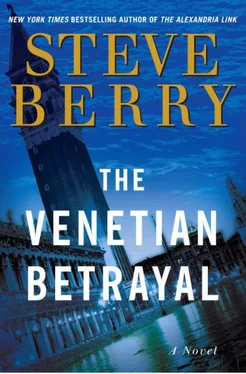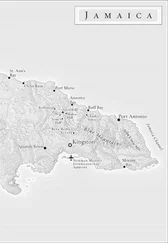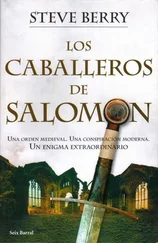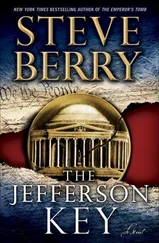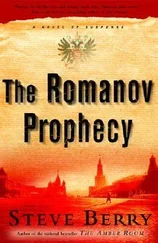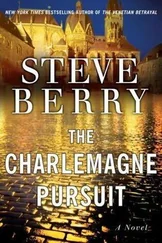“Your end of our bargain, as we originally discussed long ago.”
“I’ll be ready to meet with the Council in a few days. First, there are things I need to resolve.”
“I’m more interested in when you and I will meet.”
She chuckled. “I’m sure you are. I am, too, actually. But there are things I must complete.”
“My time on the Council ends soon. Thereafter, you’ll have others to deal with. They may not be as accommodating.”
She laughed. “I love that. Accommodating. I do enjoy dealing with you, Enrico. We so understand each other.”
“We need to talk.”
“Soon. First, you have that other problem we spoke about. The Americans.”
Yes, he did. “Not to worry, I plan to deal with that today.”
COPENHAGEN
“WHAT DO YOU MEAN NOT EXACTLY ?” MALONE ASKED THORVALDSEN.
“I commissioned a fake elephant medallion. It’s quite easy to do, actually. There are many counterfeits on the market.”
“And why did you do that?”
“Cotton,” Cassiopeia said to him, “these medallions are important.”
“Gee, never would have guessed. What I haven’t heard is how and why.”
“What do you know of Alexander the Great, after he died?” Thorvaldsen asked. “With what happened to his body.”
He’d read on the subject. “I know some.”
“I doubt you know what we do,” Cassiopeia said. She stood beside one of the bookshelves. “Last fall, I received a call from a friend who worked at the cultural museum in Samarkand. He’d found something he thought I might like to see. An old manuscript.”
“How old?”
“First or second century after Christ. Ever hear of X-ray fluorescence?”
He shook his head.
“It’s a relatively new procedure,” Thorvaldsen said. “During the early Middle Ages, parchment was so scarce that monks developed a recycling technique where they scraped away the original ink, then reused the clean parchment for prayer books. With fluorescence, X-rays are formed from a particle accelerator, then bombarded onto the recycled parchment. Thankfully, the ink used centuries ago contained lots of iron. When the X-rays hit that ink, molecules deep in the parchment glow, and those images can be recorded. Pretty amazing, actually. Like a fax from the past. Words once thought erased, written over with new ink, reappear from their molecular signature.”
“Cotton,” Cassiopeia said, “what we know firsthand about Alexander is confined to the writings of four men who all lived nearly five hundred years after Alexander. Ephemerides, Alexander’s so-called royal journal, which was supposedly contemporaneous, is useless-the victor rewriting history. The Alexander Romance, which many people cite as authority, is wild fiction and bears little relation to reality. The other two, though, were written by Arrian and Plutarch, both reputable chroniclers.”
“I’ve read the Alexander Romance. Great story.”
“But that’s all it is. Alexander is like Arthur, a man whose actual life has been replaced with romantic legend. He’s now regarded as some great, benign conqueror. Some sort of statesman. Actually, he slaughtered people on an unprecedented scale and totally squandered the resources of the lands he acquired. He murdered friends out of paranoia and led most of his troops to early deaths. He was a gambler who staked his life, and the lives of those around him, on chance. There’s nothing magical about him.”
“I disagree,” he said. “He was a great military commander, the first person to unite the world. His conquests were bloody and brutal because that’s war. True, he was bent on conquering, but his world seemed ready to be conquered. He was politically shrewd. A Greek, who ultimately became a Persian. From everything I’ve read, he seemed to have little use for petty nationalism-and I can’t fault him for that. After he died his generals, the Companions, divided the empire among themselves, which ensured that Greek culture dominated for centuries. And it did. The Hellenistic Age utterly changed Western civilization. And all that started with him.”
He saw that Cassiopeia did not agree with him.
“It’s that legacy which was discussed in the old manuscript,” she said. “What actually happened after Alexander died.”
“We know what happened,” he said. “His empire became the prey of his generals and they played finders-keepers with his body. Lots of differing accounts about how they each tried to highjack the funeral cortege. They all wanted the body as a symbol of their power. That’s why it was mummified. Greeks burned their dead. But not Alexander. His corpse needed to live on.”
“It’s what happened between the time when Alexander died in Babylon and when his body was finally transported back west that concerned the manuscript,” Cassiopeia said. “A year passed. A year that’s critical to the elephant medallions.”
A soft ring broke the room’s silence.
Malone watched as Henrik removed a phone from his pocket and answered. Unusual. Thorvaldsen hated the things, and especially detested people who talked on one in front of him.
Malone glanced at Cassiopeia and asked, “That important?”
Her expression stayed sullen. “It’s what we’ve been waiting for.”
“Why you so chipper?”
“You may not believe this, Cotton, but I have feelings, too.”
He wondered about the caustic comment. When she’d visited Copenhagen during Christmas, they’d spent a few pleasant evenings together at Christiangade, Thorvaldsen’s seaside home north of Copenhagen. He’d even given her a present, a rare seventeenth-century edition on medieval engineering. Her French reconstruction project, where stone by stone she was building a castle with tools and raw materials from seven hundred years ago, continued to progress. They’d even agreed that, in the spring, he’d come for a visit.
Thorvaldsen finished his call. “That was the thief from the museum.”
“And how did he know to call you?” Malone asked.
“I had this phone number engraved on the medallion. I wanted to make it perfectly clear that we’re waiting. I told him that if he wants the original decadrachm he’s going to have to buy it.”
“Knowing that, he’ll probably kill you instead.”
“We’re hoping.”
“And how do you plan to prevent that from happening?” Malone asked.
Cassiopeia stepped forward, her face rigid. “That’s where you come in.”
VIKTOR LAID THE PHONE BACK IN ITS CRADLE. RAFAEL HAD STOOD by the window and listened to the conversation.
“He wants us to meet in three hours. At a house north of town, on the coastal highway.” He held up the elephant medallion. “They knew we were coming-and for some time-to have this made. It’s quite good. The forger knew his craft.”
“This is something we should report.”
He disagreed. Minister Zovastina had sent him because he was her most trusted. Thirty men guarded her on a daily basis. Her Sacred Band. Modeled after ancient Greece ’s fiercest fighting unit, which fought valiantly until Philip of Macedonia and his son, Alexander the Great, slaughtered them. He’d heard Zovastina speak on the subject. The Macedonians were so impressed with the Sacred Band’s bravery that they erected a monument in their memory, which still stood in Greece. When Zovastina assumed power, she’d enthusiastically revived the concept. Viktor had been her first recruit, and he’d located the other twenty-nine, including Rafael, an Italian whom he’d found in Bulgaria, working for that government’s security forces.
“Should we not call Samarkand?” Rafael asked again.
Читать дальше
